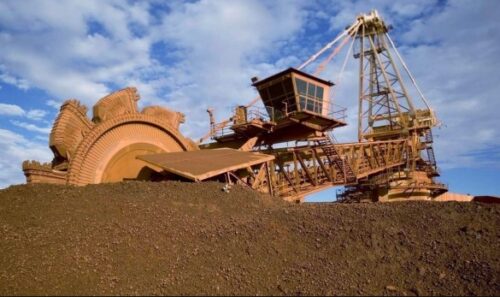>>REAL-TIME UPDATES IN THE WIRE. CLICK HERE<<<
China’s iron ore futures fell below a key 900 yuan per tonne mark to hit the lowest level since early April on Thursday. Analysts say the plunge may be just the start of what could be a sustained decline for the rest of the year as domestic demand is expected to soften further amid an increasingly strict government campaign to cut steel output.
The most-traded iron ore futures contract on the Dalian Commodity Exchange, for January delivery, plunged as much as more than 7 per cent to hit 885.5 yuan per tonne, their lowest since early April.
“Domestic consumption for iron ore is weakening significantly… due to different perception of crude steel output cuts, iron ore prices have been fluctuated recently,” analysts with Huatai Futures wrote in a note.
Under the current strict implementations of steel production controls, high iron ore prices are not seen to be supported, it added.
Prices of spot 62% iron ore for delivery to China stood at $185.5 per tonne on Wednesday, according to SteelHome consultancy.
In a research note this week, the China International Capital Corp (CICC) warned that as China’s domestic steel production is set to ease, and that iron ore prices will likely drop to below $200 per ton.
“We expect that growth pace of China’s steel production will turn negative starting in the third quarter and iron ore pries will also fall from the top,” CICC said.
Lifted by robust demand both at home and overseas, China’s steel output surged in the first half of the year, with crude steel output jumping 11.8 percent year over year, according to the National Development and Reform Commission (NDRC), the top economic planner. The country’s steel exports jumped 30.2 percent year on year during the period, the NDRC said.
However, due to environmental and other policy goals, China has moved swiftly to restrict steel production. In the latest move, the State Council, China’s cabinet, has announced tariff hikes on certain steel products in a move to reduce steel exports, which came into effect on Sunday.
Industry insiders say that other measures have also been taken to curb steel production. “Cutting production is the main theme for the entire steel industry for the rest of the year not only because of environmental goals but also the unsustainability for firms to produce so much steel when the cost is so high,” a steel industry insider said, adding that steelmakers have been asked to “strictly follow government coordination.”
Given the rapid growth in steel output in the first half of the year, the task to cut steel production to ensure full-year output is largely in line with the level in 2020 could be very challenging but serious reduction is widely expected, analysts said. That could be mean steel production could drop as much as 12 per cent year-on-year in the second half of the year, analysts say.
The China Iron and Steel Association on Monday urged steel mills to further “enhance self-discipline” and stay cautions over the risk of rising costs. The industry body also noted that the market will likely return to a “stable range’ for the rest of the year if supply and demand is kept balanced.
China’s restrictions on steel productions have also already dragged down iron ore prices. Last Friday, the most-traded iron ore futures contract on the Dalian Commodity Exchange slumped 8.1 per cent to 1,027 yuan ($158.95) per tonne, adding to a monthly loss of nearly 8 per cent – the largest drop since February 2020.
If China’s steps up restrictions on steel production in the remainder of the year, that could have huge implications for the country’s massive iron ore imports, with the vast majority coming from Australia.
In the first six months of the year, China imported 560.71 million tons of iron ore, up 2.6 percent year-on-year, which worth 603.2 billion yuan, according to Chinese customs data. During the period, average prices for imported iron ore reached 1,075 yuan per ton.

